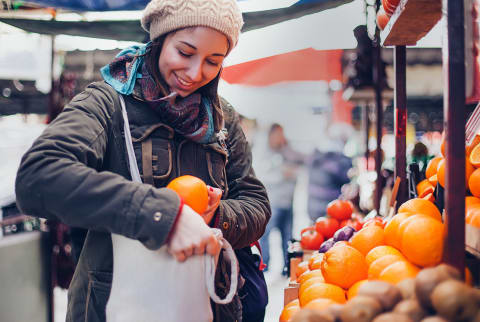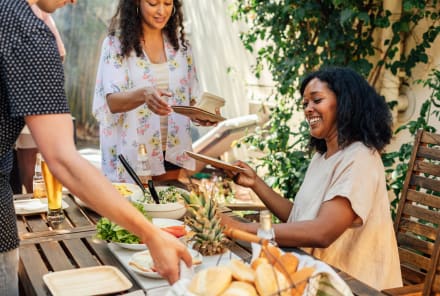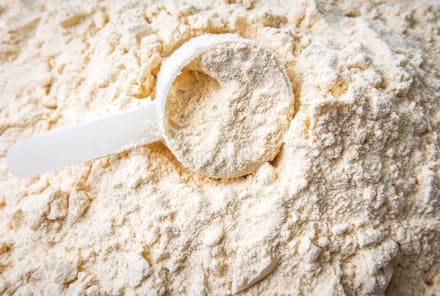Advertisement
What France Can Teach Us About Healthy, Sustainable Living


We've long admired the French for their food philosophy, breezy approach to beauty, and genius self-care routines. And according to a new report, we should envy their commitment to sustainability, too.
France ranked No. 1 overall on this year's Food Sustainability Index (FSI), developed by the Economist Intelligence Unit with the Barilla Center for Food & Nutrition Foundation. The FSI analyzed 34 of the world's most developed nations to see how they stacked up on food waste, sustainable agriculture, and nutrition.
With an overall ranking of 74.79, France took home the gold, due in large part to its commitment to fighting food waste. Last year, it became the first country to pass legislation prohibiting supermarkets from throwing away food based on its sell-by date. Instead, they are required to donate all food that is still edible to a charity or food bank. Any store larger than 4,305 square feet is expected to sign donation contracts with charities to avoid a hefty fine or even jail time. Policies like this have helped the country get its food waste down to 1.8 percent annually (compared to America's 40 percent). France is also in the process of phasing out chemical pesticides like glyphosate by 2020, further illustrating a commitment to healthy, sustainable food for all citizens.
Japan grabbed the No. 2 spot on this year's FSI list, earning high marks for its nutrition standards, and Germany wasn't far behind. Perhaps unsurprisingly, the United States did not earn a spot in the top five. We're sitting at 21st place overall, thanks to the greenhouse gas emissions of our agricultural sector.
How to take a green cue from the French.
French locals, and their fans, have shared their secrets to living well on mbg for years. Here are a few of their top tips for sustainable eating habits that we can take back to the states:
- "Most Parisians shop daily for fresh local ingredients. You go to the boulangerie for bread, the fromagerie for cheese, the patisserie for dessert pastries," blogger Jocelyn Steiber noticed on her trip to Paris. Eating local is a way to cut down on the carbon footprint of your food and get to know your supplier.
- Zero-waste icon Bea Johnson avoids food wrapped in plastic, opting instead for fresh, whole food that tends to be healthier anyways. "We let go of the things that were too extreme—instead of making my own bread, I bring a pillowcase to the bakery. Instead of making my own cheese, I bring my own jar to the cheese counter," the France native says of her home.
- During her journey living abroad, Travel writer Jacqueline Parisi saw that French women utilize their freezers more than the typical American. Once they see produce at its peak, they buy it and toss it in the freezer for later use instead of trying to gobble up all their groceries in a few days.
- Environmental writer Holly Rose spends half of her time in Paris and half in America, and she's found that the French tend to cook for themselves a lot more. This tends to be less wasteful than eating out.
- Rather than heaping their plates full of food, the French enjoy smaller portions of everything, says France transplant Mikki Brammer. Start with smaller portions and then eat more if needed instead of preparing a huge portion you'll be tempted to toss.
Shop like a French woman with this grocery list that will help you avoid food waste.
Watch Next
Enjoy some of our favorite clips from classes
Enjoy some of our favorite clips from classes
What Is Meditation?
Mindfulness/Spirituality | Light Watkins
Box Breathing
Mindfulness/Spirituality | Gwen Dittmar
What Breathwork Can Address
Mindfulness/Spirituality | Gwen Dittmar
The 8 Limbs of Yoga - What is Asana?
Yoga | Caley Alyssa
Two Standing Postures to Open Up Tight Hips
Yoga | Caley Alyssa
How Plants Can Optimize Athletic Performance
Nutrition | Rich Roll
What to Eat Before a Workout
Nutrition | Rich Roll
How Ayurveda Helps Us Navigate Modern Life
Nutrition | Sahara Rose
Messages About Love & Relationships
Love & Relationships | Esther Perel
Love Languages
Love & Relationships | Esther Perel











